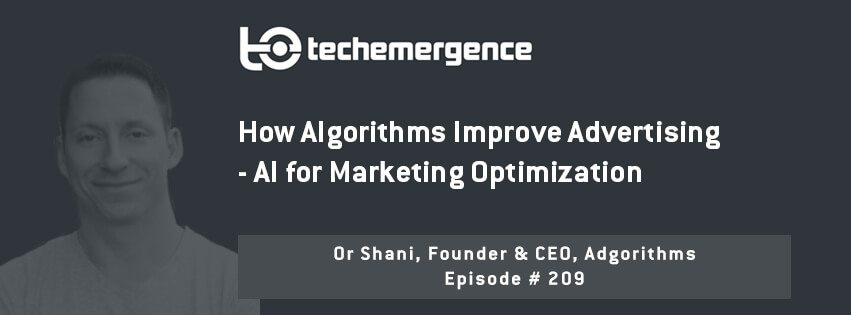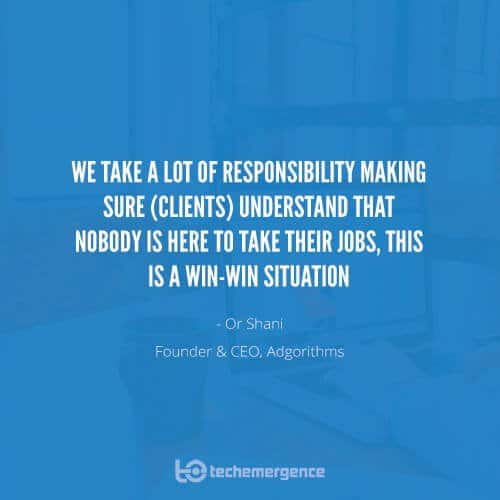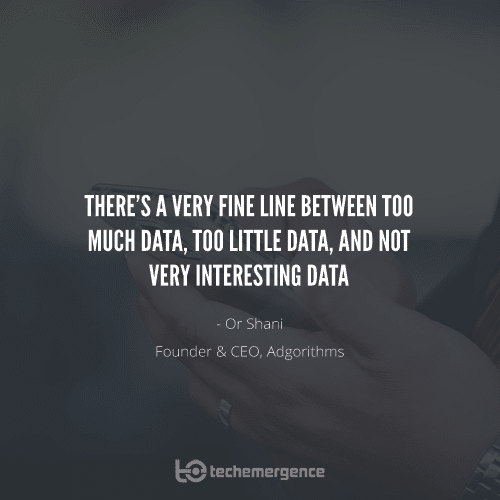
Episode Summary: In marketing, there are lots of applications in AI and machine learning (ML), from recommendation engines to predictive analytics and beyond. At the company Albert, there are even more ambitious projects underway – like automating the process of marketing altogether by having a machine run and generate ads, or test and spend the marketing budget of a company. Or Shani, CEO of Adgorithms, focuses on the quantitative aspects and optimization of marketing, using algorithms to improve advertising processes. In this interview, Shani talks about how Adgorithms’ smart marketing platform “Albert” meshes with humans in marketing, and also discusses how these roles might change over the next 5 to 10 years as we move towards an ever more automated marketplace.
(Note: Readers of this article might also enjoy our AI in marketing executive consensus, which includes predictions, infographics, and insights from over 50 marketing executives in the artificial intelligence field.)
Expertise: Marketing and advertising, programmatic buying and predictive analytics
Brief Recognition: Or Shani is CEO and founder of Adgorithms and the visionary behind Albert, the company’s self-driven marketing and advertising platform. Shani’s inspiration for Albert came from his frustration with the inefficiencies of widely-accepted digital advertising practices, such as manual “optimization” and assigning “experts” to each individual advertising channel. Prior to Adgorithms, Shani spent a decade working in online advertising, primarily as a data scientist and ultimately as a VP, Marketing, for Supersonic Ads, Online 365 Ltd, Playtech Group, and others.
Current Affiliations: CEO and Founder of Adgorithms; Founder of the AI Marketing Association; Member of the Forbes Technology Council and the Young Presidents Organization (YPO); Contributor to publications like Forbes, Wired, AdExchanger, CMO.com, Marketing Land, and others.
Interview Highlights:
The following is a condensed version of the full audio interview, which is available in the above links on Emerj’s SoundCloud and iTunes stations.
(2:16) Give us a rundown of in this process of automating advertising, the optimization of digital ads spend, where do the humans play a role and where does the machine play its role?
The way we look at signs in our company or our perspective is you can separate marketing into separate sides – one is the creative side and the other one is the execution, the data analysis, the big data problems, etc. For us, when we started 6 years ago to build Albert, it’s really distinct that the creative is something that’s very much human, it’s hard to say, ‘let’s mimic the human mind, let’s try to find why red is so attractive to so many people or why people don’t like the color green”; where everything has to do with big data calculations, from very easy calculations like 7×3 to very complex, is something that the machine has a clear advantage of…
…when we developed Albert, we kind of set the plates of the humans to mainly focus on the creative side, and this is what we let our clients – the advertisers – do…
(4:50) Talk a little a bit about the initial process…what’s that front end human work that goes into setting the machine up to win?
There’s two different things here – first the creative side – you essentially bulk upload a lot of the creative; in our platform, you can just upload whatever you want…and the second part, and we kind of discussed that earlier, is when we onboard a client, it’s a little like building a factory for marketing, so we interview them to understand what exactly is driving their business – what is their P&L? What kind of KPI’s are very important to them? What type of insights do they want to get? And we build like a small version of Albert that’s going to be dedicated just for them…and the last level we have is a monitoring level…we have an R&D center in Tel Aviv and look over what Albert does to make sure there’s not big mistakes or anomalies…
(7:36) How do companies, generally with your technology today, maintain a connection to Albert?
Obviously we have our own dashboard and we have our own automated email that’s going to send daily or monthly or weekly…it truly varies from client to client and their needs and how they work…we let the client kind of understand and define, do they want it high touch or less? One of the main connections between the client and Albert is what we call the “actionable insights”, and what Albert actually does – one of the things I hated when I used to be a marketer…is to run reports…we built Albert int a way that he runs the report…so at the end of they day he spits out just the most important things and can back it up with the actual reports…
(11:50) What delineates a most important insight…how is that decision making being done?
…By using some kind of recommendation engine, we give Albert the opportunity to recommend what he thinks are going to be the best ways, and in our system we can actually track whether somebody read it or acted upon that, so it creates a feedback loop for Albert to know, did he suggest and give the right insights or not?…
(17:21) When the world is more full of machines optimizing for targeting and segmentation, what does that look like for businesses and consumers…how is marketing itself potentially altered in the next 5 to 10 years?
I think it’s going to change in many dimensions, but I think it’s less scary than what people imagine…I think that right now, in marketing it’s so complex, there’s so many things…Facebook, in 6 years they changed from top to bottom…what people are doing today is really not a good enough job, not because they’re not smart enough…but because you don’t have enough time to really do everything you want to do…
What Albert and what I believe is going to be a lot of competitors coming forward in the next few years, they’re trying to fiddle into this space where the human element is kind of limiting your possibilities and it will open up more possibilities for you, and so I think people will be more focused on the creative, on the human side of things…
…I think what I kind of understood a few years ago, you don’t need to go all the way automated everything; you need to get to the place where humans can have an amazing advantage, and you have to bring the machine in…and let them work together…there are a lot of business hurdles to slow the progress unfortunately, but nobody doubts that this is the future….

Big Ideas:
1 – When implementing any new artificial intelligence technology (like Albert), it’s important for companies to communicate accurate information i.e. this technology will not necessarily eliminate the need for human work, but will open up more oversight positions and creative possibilities that weren’t there before.
2 – The technology is mostly available now for advertising applications of AI (and other functions across industries), but change, in terms of the human element, takes time—and planning.












